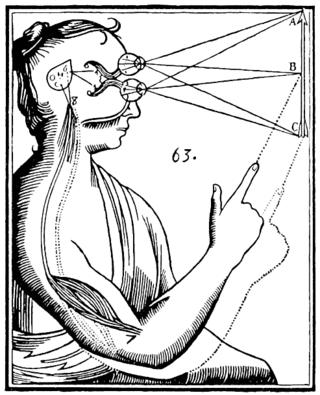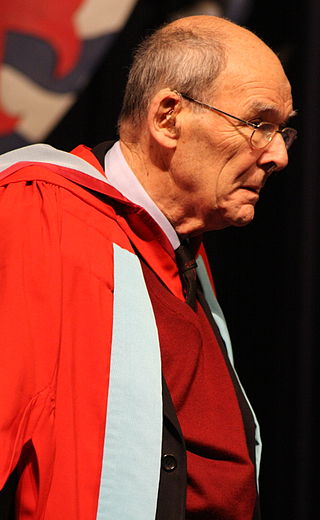Existence is the ability of an entity to interact with reality. In philosophy, it refers to the ontological property of being.

Metaphysics is the branch of philosophy that studies the fundamental nature of reality, including the first principles of: being or existence, identity and change, space and time, cause and effect, necessity, and possibility.

In metaphysics, nominalism is the view that universals and abstract objects do not actually exist other than being merely names or labels. There are at least two main versions of nominalism. One version denies the existence of universals – things that can be instantiated or exemplified by many particular things. The other version specifically denies the existence of abstract objects – objects that do not exist in space and time.

In metaphysics, ontology is the philosophical study of being, as well as related concepts such as existence, becoming, and reality.

The problem of universals is an ancient question from metaphysics that has inspired a range of philosophical topics and disputes: Should the properties an object has in common with other objects, such as color and shape, be considered to exist beyond those objects? And if a property exists separately from objects, what is the nature of that existence?
In philosophy, physicalism is the metaphysical thesis that "everything is physical", that there is "nothing over and above" the physical, or that everything supervenes on the physical. Physicalism is a form of ontological monism—a "one substance" view of the nature of reality as opposed to a "two-substance" (dualism) or "many-substance" (pluralism) view. Both the definition of "physical" and the meaning of physicalism have been debated.

Reductionism is any of several related philosophical ideas regarding the associations between phenomena which can be described in terms of other simpler or more fundamental phenomena. It is also described as an intellectual and philosophical position that interprets a complex system as the sum of its parts.

In the philosophy of mind, mind–body dualism denotes either the view that mental phenomena are non-physical, or that the mind and body are distinct and separable. Thus, it encompasses a set of views about the relationship between mind and matter, as well as between subject and object, and is contrasted with other positions, such as physicalism and enactivism, in the mind–body problem.
Holism is the interdisciplinary idea that systems possess properties as wholes apart from the properties of their component parts. The concept of holism informs the methodology for a broad array of scientific fields and lifestyle practices. When applications of holism are said to reveal properties of a whole system beyond those of its parts, these qualities are referred to as emergent properties of that system. Holism in all contexts is opposed to reductionism which is the notion that systems containing parts contain no unique properties beyond those parts. Scientific proponents of holism consider the search for these emergent properties within systems the primary reason to incorporate it into scientific assumptions or perspective.
In logic and philosophy, a property is a characteristic of an object; a red object is said to have the property of redness. The property may be considered a form of object in its own right, able to possess other properties. A property, however, differs from individual objects in that it may be instantiated, and often in more than one object. It differs from the logical/mathematical concept of class by not having any concept of extensionality, and from the philosophical concept of class in that a property is considered to be distinct from the objects which possess it. Understanding how different individual entities can in some sense have some of the same properties is the basis of the problem of universals.
In metaphysics, the distinction between abstract and concrete refers to a divide between two types of entities. Many philosophers hold that this difference has fundamental metaphysical significance. Examples of concrete objects include plants, human beings and planets while things like numbers, sets and propositions are abstract objects. There is no general consensus as to what the characteristic marks of concreteness and abstractness are. Popular suggestions include defining the distinction in terms of the difference between (1) existence inside or outside space-time, (2) having causes and effects or not, (3) having contingent or necessary existence, (4) being particular or universal and (5) belonging to either the physical or the mental realm or to neither. Despite this diversity of views, there is broad agreement concerning most objects as to whether they are abstract or concrete. So under most interpretations, all these views would agree that, for example, plants are concrete objects while numbers are abstract objects.

David Malet Armstrong, often D. M. Armstrong, was an Australian philosopher. He is well known for his work on metaphysics and the philosophy of mind, and for his defence of a factualist ontology, a functionalist theory of the mind, an externalist epistemology, and a necessitarian conception of the laws of nature. He was elected a Foreign Honorary Member of the American Academy of Arts and Sciences in 2008.

Property dualism describes a category of positions in the philosophy of mind which hold that, although the world is composed of just one kind of substance—the physical kind—there exist two distinct kinds of properties: physical properties and mental properties. In other words, it is the view that non-physical, mental properties exist in, or naturally supervene upon, certain physical substances.
Anomalous monism is a philosophical thesis about the mind–body relationship. It was first proposed by Donald Davidson in his 1970 paper "Mental Events". The theory is twofold and states that mental events are identical with physical events, and that the mental is anomalous, i.e. under their mental descriptions, relationships between these mental events are not describable by strict physical laws. Hence, Davidson proposes an identity theory of mind without the reductive bridge laws associated with the type-identity theory. Since the publication of his paper, Davidson refined his thesis and both critics and supporters of anomalous monism have come up with their own characterizations of the thesis, many of which appear to differ from Davidson's.
Metaphysical naturalism is a philosophical worldview which holds that there is nothing but natural elements, principles, and relations of the kind studied by the natural sciences. Methodological naturalism is a philosophical basis for science, for which metaphysical naturalism provides only one possible ontological foundation. Broadly, the corresponding theological perspective is religious naturalism or spiritual naturalism. More specifically, metaphysical naturalism rejects the supernatural concepts and explanations that are part of many religions.

Philosophy of mind is a branch of philosophy that studies the ontology and nature of the mind and its relationship with the body. The mind–body problem is a paradigmatic issue in philosophy of mind, although a number of other issues are addressed, such as the hard problem of consciousness and the nature of particular mental states. Aspects of the mind that are studied include mental events, mental functions, mental properties, consciousness and its neural correlates, the ontology of the mind, the nature of cognition and of thought, and the relationship of the mind to the body.
Brian Ellis is an Australian philosopher. He is an Emeritus Professor in the philosophy department at La Trobe University in Victoria, Australia, and Professional Fellow in philosophy at the University of Melbourne. He was the Editor of the Australasian Journal of Philosophy for twelve years. He is one of the major proponents of the New Essentialist school of philosophy of science.

The philosophy of color is a subset of the philosophy of perception that is concerned with the nature of the perceptual experience of color. Any explicit account of color perception requires a commitment to one of a variety of ontological or metaphysical views, distinguishing namely between externalism/internalism, which relate respectively to color realism, the view that colors are physical properties that objects possess, and color fictionalism, the view that colors possess no such physical properties.
Relations are ways in which things, the relata, stand to each other. Relations are in many ways similar to properties in that both characterize the things they apply to. Properties are sometimes treated as a special case of relations involving only one relatum. In philosophy, theories of relations are typically introduced to account for repetitions of how several things stand to each other.

In philosophy, naturalism is the idea or belief that only natural laws and forces operate in the universe.










